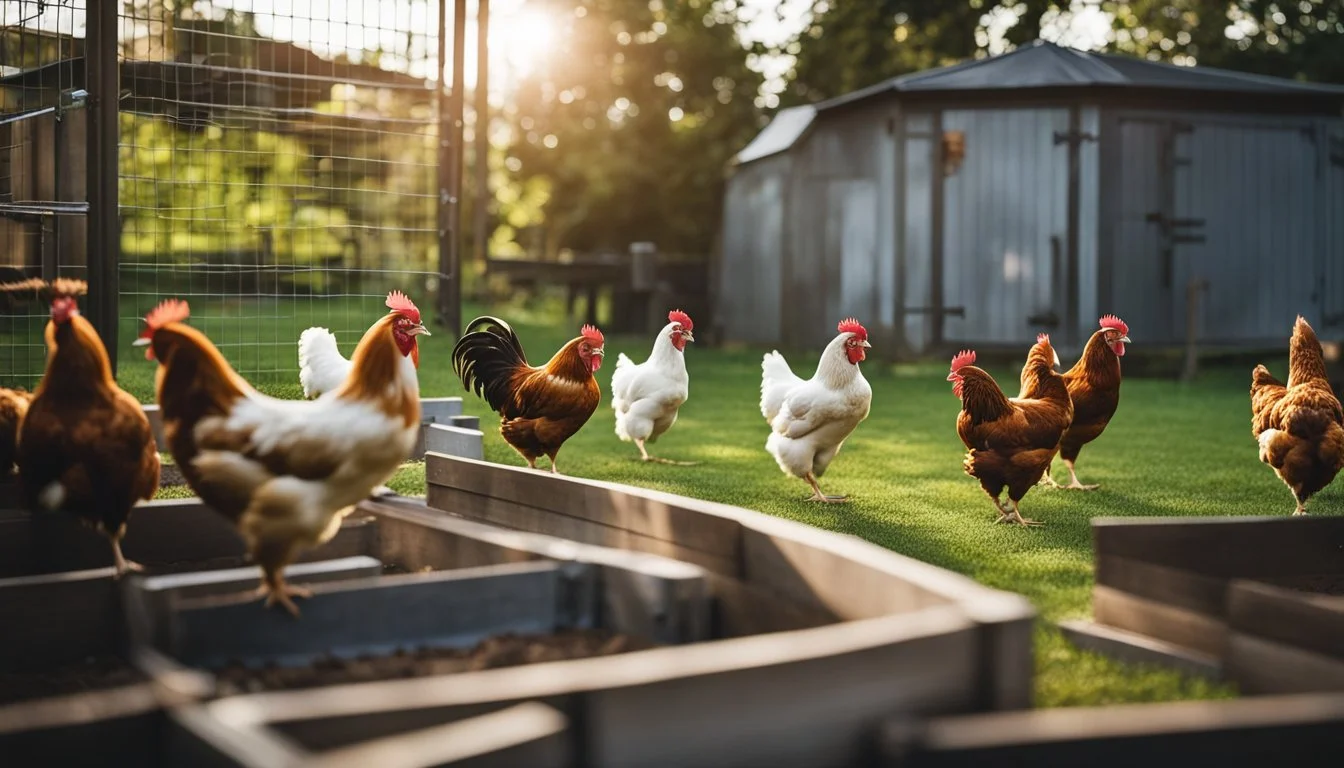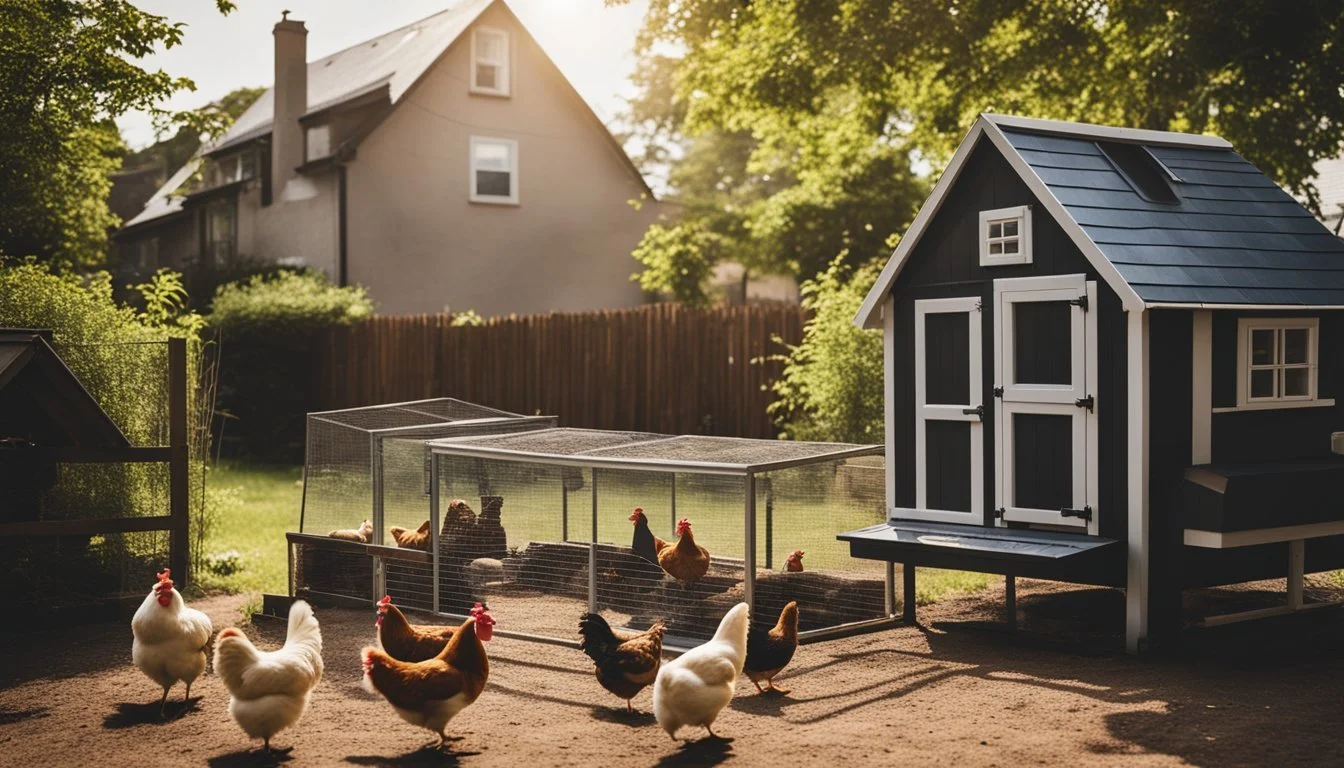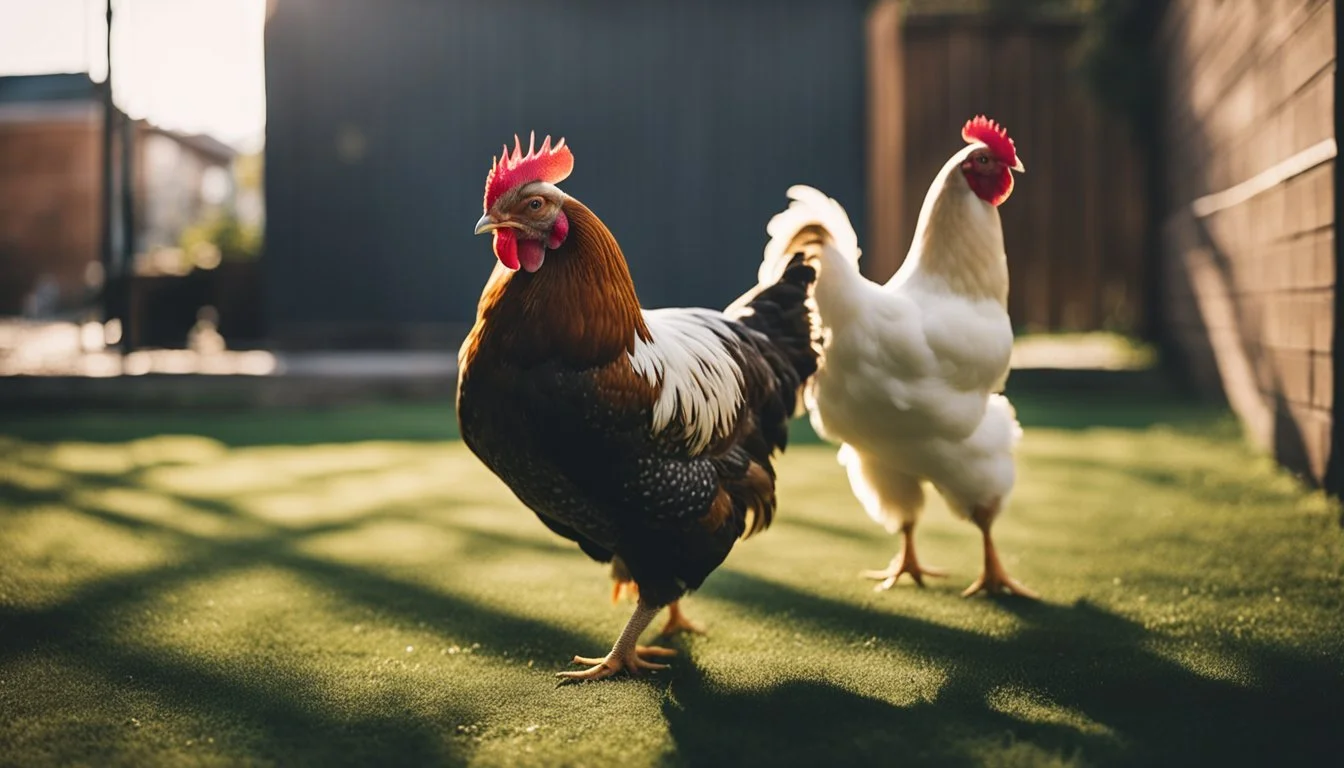7 Tips for Keeping Chickens Quiet in the City
Urban Poultry Management
Urban living comes with its own set of challenges, especially for those who wish to raise chickens in close-knit communities. Noise from chickens can become a concern for both owners and neighbors. Addressing this not only keeps the peace but ensures a positive experience for everyone involved.
This article aims to provide practical, actionable tips for maintaining a quiet flock in a city environment. By implementing these strategies, chicken keepers can enjoy the benefits of their feathered friends without causing a disturbance.
1) Use Quiet Chicken Breeds
Choosing the right chicken breeds is crucial for maintaining peace in an urban setting. Certain breeds are known for their calm and quiet nature, making them ideal for city environments.
Breeds like the Speckled Sussex are well-regarded for their friendly demeanor and low noise levels. These chickens are dual-purpose, providing both meat and eggs, which adds to their practicality.
Another excellent choice is the Buff Orpington. These chickens are known for their docile and quiet nature, making them a favorite among backyard chicken keepers. They also lay a good number of eggs, adding to their appeal.
Lavender Orpingtons are also a highly recommended breed for urban settings. They are quiet, easy to handle, and have a gentle disposition. These characteristics make them less likely to disturb neighbors.
In addition to Sussex and Orpingtons, other breeds such as Australorps and Cochins are also good choices. These breeds tend to be quieter and more docile compared to others.
Selecting quieter breeds can significantly reduce the noise levels in your backyard, ensuring a more harmonious living situation with your neighbors.
2) Install soundproofing in the coop
To minimize noise, it's crucial to install effective soundproofing in the chicken coop. Adding insulation material to the coop’s walls will help dampen the sounds coming from inside. Use nails or staples to attach the insulation, making sure the entire surface is covered.
For additional soundproofing, consider using mass loaded vinyl (MLV) barriers. MLV is a dense material that can block and reflect sound, reducing the noise that escapes. Installing MLV between the insulation and the outer wall can enhance the coop’s soundproofing capabilities.
Cover the insulation and MLV with plywood to keep the materials secure and out of the chickens’ reach. This not only protects the soundproofing materials but also ensures the interior remains safe and clean for the chickens.
Vent covers modified with sound-absorbing materials can also aid in reducing noise transmission while maintaining proper ventilation. This keeps the coop well-ventilated and quiet, providing a more peaceful environment for both the chickens and the neighbors.
3) Provide Plenty of Nesting Boxes
Providing an ample number of nesting boxes is essential for maintaining a peaceful chicken coop in an urban setting.
Each nesting box should be shared by no more than three to four hens. Overcrowding can lead to stress and noise, as hens may compete for their preferred laying spots.
The boxes should be adequately sized to fit the hens comfortably. A standard size for most breeds is a 12-inch cube. Larger breeds, such as Jersey Giants, may require a bit more width.
Placing the nesting boxes in quieter, dimly lit areas can encourage use and reduce disturbances. Adding curtains to the front of the boxes can offer the necessary seclusion.
Ensure that the nesting boxes are kept clean and dry. Chickens are more likely to use them if they are well-maintained. Regularly check for and remove any soiled bedding.
Finally, consider adding soft bedding material, such as straw or wood shavings. This can make the boxes more inviting and comfortable for egg-laying, further reducing stress and noise.
4) Keep Chickens Well-Fed
Maintaining a well-fed flock is essential for keeping chickens quiet in the city. When chickens are hungry, they tend to make more noise, clucking and squawking to express their discomfort.
Ensure they have constant access to a balanced diet. This includes high-quality feed that meets their dietary needs, along with fresh water.
In addition to their regular feed, supplement their diet with kitchen scraps and greens. This not only provides variety but also keeps them occupied and less likely to make noise out of boredom.
Regular feeding schedules can help prevent hunger-induced noise. Feeding them at the same times every day can establish a routine, helping to reduce unnecessary vocalizations.
Always monitor the health and weight of your chickens. Adequate nutrition supports overall well-being, reducing stress-related noise. Make adjustments to their diet as necessary, ensuring they're neither underfed nor overfed.
By keeping chickens well-fed, city hens remain more content and quieter, creating a peaceful environment for everyone.
5) Offer enrichment activities
Enrichment activities are essential for keeping chickens calm and content. Introducing various forms of stimuli can reduce stress and noise levels. Simple items like suet blocks, filled with seeds and nuts, can be hung around the coop to engage their natural pecking behaviors.
Moveable habitats, also known as chicken tractors, allow chickens to explore new environments safely. This controlled roaming helps meet their foraging needs and keeps them engaged. Foraging can also be encouraged with bushy plants and straw bales within their enclosure.
Interactive toys like dog puzzles stuffed with treats can provide mental stimulation. These activities encourage problem-solving and distract chickens from potential stressors. Additionally, offering frozen treats made from fruits and vegetables can be both refreshing and engaging during warmer months.
A dust bath area is another valuable addition. Dust baths allow chickens to clean themselves and exhibit natural behaviors, which contributes to their overall well-being. By enriching their environment, chickens are less likely to be noisy and more likely to stay calm and content.
6) Use calming herbs like lavender
Using calming herbs like lavender can be an effective way to keep chickens quiet in the city. Lavender is known for its soothing properties, which can help reduce stress and anxiety in chickens. Introducing lavender into the coop environment creates a more peaceful atmosphere.
Dried lavender bundles can be placed around the coop. The aroma from the lavender not only benefits the chickens but also helps repel bugs, keeping the coop cleaner. A less stressed flock is less likely to make excessive noise.
Other herbs, such as chamomile and lemon balm, can also provide calming effects. These can be mixed with lavender or used on their own. Adding these herbs to nesting boxes or sprinkled in the coop bedding can enhance their calming impact.
Implementing calming herbs is a natural, non-invasive method to keep your chickens content and quiet. It also adds a pleasant fragrance to the coop, making it more enjoyable for both the chickens and their caretakers.
7) Spend Time with Your Chickens Daily
Spending time with chickens daily boosts their overall well-being. Regular human interaction can reduce stress in chickens, leading to quieter behavior. Observing them closely helps in detecting early signs of distress or illness.
Daily engagement with chickens strengthens the bond between the owner and the flock. This bonding encourages trust and a more relaxed demeanor among the chickens.
Activities like light training, feeding treats, or simply sitting near their coop make chickens feel secure. Secure chickens are less prone to sudden outbursts of noise.
Monitoring the flock daily also allows for quick identification of any environmental stressors. Addressing these promptly ensures a peaceful and harmonious environment, minimizing disturbances.
Understanding Chicken Behavior
To keep chickens quiet in urban environments, it's important to grasp their natural vocalizations and the factors that influence noise levels. This foundational knowledge helps in crafting effective strategies for managing chicken noise.
The Natural Vocalizations of Chickens
Chickens communicate with a variety of vocalizations. They cluck to stay in contact with each other and alert the flock to food.
Growling might occur if a chicken feels threatened or cornered. Hens cackle loudly after laying an egg, a behavior known as the “egg song.” Roosters crow to establish territory and assert dominance, typically at dawn but also throughout the day.
Understanding these natural sounds can help identify the triggers behind excessive noise. By recognizing when chickens are vocalizing naturally versus due to distress, it's possible to tailor quieter raising practices more effectively.
Factors Influencing Noise Levels
Several factors can affect a chicken's noise level. Breed choice is crucial; some breeds are naturally quieter, making them more suitable for urban settings. For instance, Bantams and Silkies tend to be less vocal compared to others.
Environmental conditions also play a significant role. Chickens need enough space to roam and areas where they feel secure. Overcrowding and lack of safe spaces can lead to louder, more stressed birds.
Daily care routines impact noise as well. Consistent feeding schedules, clean coops, and regular handling keep chickens calm. Introducing deterrents like using water can help manage particularly noisy birds.
Addressing these elements will lead to a quieter and more harmonious urban chicken-keeping experience.
Environmental Modifications
Creating a tranquil environment for urban chickens involves strategic coop design and effective soundproofing. Addressing these aspects can significantly reduce noise levels.
Designing a Quiet Coop
A quiet coop starts with selecting a location away from high-traffic areas. Placing the coop in a secluded part of the yard can buffer external sounds that may startle the chickens.
Ventilation is crucial for reducing stress and noise. Proper airflow prevents the buildup of ammonia and keeps the chickens comfortable. This can be achieved with well-placed vents and windows.
Consider constructing the coop with noise-reducing materials. Thicker walls and insulated roofing can dampen internal noises. Materials like plywood with foam insulation are ideal for minimizing sound escape.
Ample space inside the coop is essential. Overcrowding leads to stress and increased noise. Each chicken should have at least 2-3 square feet of space inside the coop, and more in the run.
Secure nesting boxes with lids can also help, as chickens tend to be quieter in darker, secure environments. Making sure there's a stomping area with sand or bedding helps in absorbing noise when the chickens move around.
Soundproofing Solutions
Soundproofing the chicken coop involves both internal and external strategies. External barriers like solid fences or dense shrubbery can reduce ambient noise entering the coop area and block some of the sounds coming from the coop.
Adding insulation to the coop walls and roof further decreases noise. Foam panels or soundproofing mats attached to the interior walls absorb sound waves.
Sealing gaps and cracks in the coop prevents noise leakage. Use caulk to fill any gaps around windows, doors, and between panels. This ensures that sounds, particularly early morning crowing, are contained within the coop.
Hanging heavy curtains or blankets over windows can block sounds from escaping. It's an effective and low-cost method to insulate against noise. Additionally, training chickens' behavior through various stimuli can reduce noise-making, but effective soundproofing serves as a constant buffer against noise pollution.
Training and Socializing Your Chickens
Proper training and socialization can help reduce stress and behavioral issues in urban chickens. This can lead to a quieter and more pleasant environment for both the chickens and their owners.
Behavioral Training Techniques
Training chickens involves teaching them to associate certain behaviors with positive rewards. Positive reinforcement is the primary method used, where chickens receive treats for desired actions. For example, they can be taught to come when called or stay within a designated area by consistently rewarding these behaviors.
Operant conditioning is another effective technique. This method encourages behaviors by providing highly desirable rewards. Over time, chickens will associate the behavior with the reward, making them more likely to repeat it. Crucial commands—like coming when called or staying in a coop—benefit from this approach.
Training tips:
Be consistent: Use the same commands and rewards.
Start simple: Begin with basic commands and gradually progress to more complex ones.
Be patient: Training can be a slow process; patience is key.
Socializing Chickens to Reduce Stress
Chickens that are well-socialized are generally calmer and quieter. Introduction to various stimuli and environments early in life can help them adapt to urban settings. Regular human interaction is essential, as it reduces the likelihood of the chickens becoming stressed or aggressive.
To socialize your chickens, expose them to different sounds, sights, and people. Regularly handling the chickens gently can also help them become more accustomed to human presence. Creating a secure and enriching environment with perches and nesting boxes provides a sense of safety, further reducing stress.
Steps to socialize:
Gradual exposure to new environments and stimuli.
Regular handling to acclimate them to human touch.
Provide variety in their environment to keep them engaged and comfortable.
Proper socialization results in happier chickens and a more peaceful urban coop.







